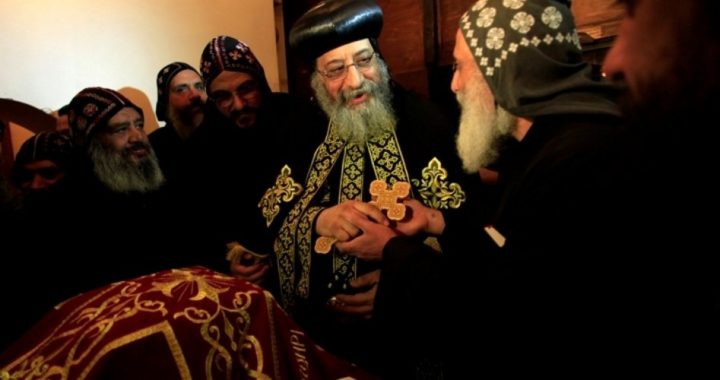
Hundreds of Christians were under siege inside St. Mark’s Coptic Orthodox Cathedral in Cairo on the night of April 8, as security forces and local residents launched a prolonged and unprecedented attack on the cathedral. St. Mark’s, located in Cairo’s Abbasiyya district, and which houses relics of the apostle after whom it is named, is the seat of the Coptic Church’s leader, Pope Tawadros II (shown).
Alastair Beach, a correspondent for the British newspaper The Independent, witnessed the exchange of gunfire as armed gangs descended on the funeral of four Coptic Christians who had been killed during violent confrontations that erupted in the area two days earlier. A Muslim man was also killed in the clashes.
Beach reported that Egyptian President Mohamed Morsi issued a statement the night of April 7, saying that he had spoken to Pope Tawadros and had given orders for the cathedral and citizens to be guarded. Morsi said that protecting the lives of both Muslims and Christians was a state responsibility and added: “I consider any attack on the cathedral as an attack on me, personally.”
The report cited statements from witnesses who were attending the funeral that they had been attacked by rock-throwing neighborhood locals and forced back inside the cathedral. Mina Zakaraya, a Coptic seminarian who was standing inside the cathedral compound, said, “Only God can save us from what is happening right now.”
Beach’s report also quoted Makram Girgis, who was sitting on the cathedral steps: “I’m worried about the situation in Egypt,” said Girgis. “The Muslim Brotherhood and extremist groups here want us to leave. They don’t accept Copts. But this was our country, ever since the time of the pharaohs.”
A BBC News reporter spoke with a local Coptic priest, Father Sourial Yunnan, who said that Christians have long lived peacefully with their Muslim neighbors, but that conditions for Christians in Egypt had deteriorated under the ruling Muslim Brotherhood. Father Yunnan, noted BBC, believes that worse trouble is yet to come.
The report quoted the political arm of the Muslim Brotherhood, the Freedom and Justice Party (FJP), which posted a statement on its Facebook page emphasizing its “utter rejection and condemnation of violence.”
FJP urged both sides “not to respond to systematic provocations” or “ploys that target the homeland.” The statement did not assign blame for who might be responsible for inciting the violence.
An April 9 report from the Qatar-based Al Jazeera news network carried a statement from Pope Tawadros that was critical of President Morsi. The Copic leader said that Morsi had promised him in a telephone conversation to do everything to protect the cathedral, “but in reality he did not.”
Tawadros, speaking in a telephone interview to a talk show broadcast by the ONTV network, said that Morsi’s attitude “comes under the category of negligence and poor assessment of events.”
The Al Jazeera report also quoted Tawadros’ reaction to Morsi’s decision on April 8 to revive a state body mandated to promote equality between Egyptians regardless of their religious and ethnic background. “We want action, not words, and, let me say this, there are many names and committees but there is no action on the ground,” Tawadros charged. “Enough already of formations, committees and groups and whatever else,” he added.
Al Jazeera noted:
Christian-Muslim confrontations have increased in Muslim-majority Egypt since the overthrow of former president Hosni Mubarak in 2011 gave freer rein to hardline Muslims repressed under his rule.
Morsi, a Muslim Brotherhood leader elected in June, had promised to protect the rights of Copts, who make up about 10 percent of Egypt’s 84 million people.
The New York Times reported on April 7 that this latest round of violence had started on Friday, April 5, when a sectarian dispute erupted in Khusus, a town north of Cairo. The report noted that hundreds of Christians — as well as sympathetic Muslims — had gathered at the cathedral for the four Christians’ funeral, chanting for the removal from power of Morsi and his Islamist allies. “With our blood and our soul we will sacrifice ourselves for the cross,” the crowd shouted.
The report noted that many Copts blame Morsi for not providing them with sufficient protection, and quoted from a statement by Bishop Bakhomious, who had led the Coptic church during the vacancy before the designation of Tawadros II. “Who is responsible for the surroundings of the cathedral being unsecured for more than five hours today?” asked Bakhomious. “If the security services want to know who is behind these events, they will.”
A Reuters report provided further details about how the initial clash started, noting that a group of Christian children were drawing on a wall of a Muslim religious institute in el Khusus. A Reuters reporter saw what looked like a swastika drawn on the wall. However, Muslim residents found the drawing offensive, saying it looked like a cross. “I saw the kids drawing on the wall after afternoon prayers so I grabbed them and told them to remove what they’d just written,” said Mahmoud Mahmoud al-Alfi, a Muslim resident.
Reportedlt, when a man started beating the children, a bystander drew his gun and fired into the air and, unfortunately, a stray bullet killed one of the children.
“Suddenly the area was full of weapons,” al-Alfi said.
As often happens during such violent confrontations, things quickly escalated. A Christian man who gave his name as Kameel, implied that the violence had been instigated by outside agitators. “There are people who want to cause sectarian strife between Muslims and Christians,” said Kameel. “I’ve been here longer than 30 years and I have never seen any violence or extremism in our area.”
Photo of Pope Tawadros: AP Images



